“If I were to wish for anything, I should not wish for wealth and power, but for the passionate sense of the potential, for the eye which, ever young and ardent, sees the possible. Pleasure disappoints, possibility never. And what wine is so sparkling, what so fragrant, what so intoxicating, as possibility!”
― Søren Kierkegaard
For quite some time now I’ve been enjoying and sharing Existential Comics, a webcomic about existentialism and other areas of philosophy. For me, Existential Comics embodies the enormous potential for entertainment and education to meld seamlessly on the Internet.
Corey Mohler, the dude behind Existential Comics, successfully takes arcane philosophical ideas and elucidates them clearly and humorously via the medium of the webcomic. This is the sort of innovative educational idea that has the potential to appeal to attention-fractured youth and to further distinguish learning from the super-serious, one-size-fits-all stuff that most of us did in school. Education can be play, after all.
If you dig Existential Comics, you’ll be excited to hear that I’m probably going to do an interview with Corey and publish it here on Refine The Mind sometime in the next couple months, so keep an eye out for that. Without further ado, the comic:
The Dark Knight of Faith
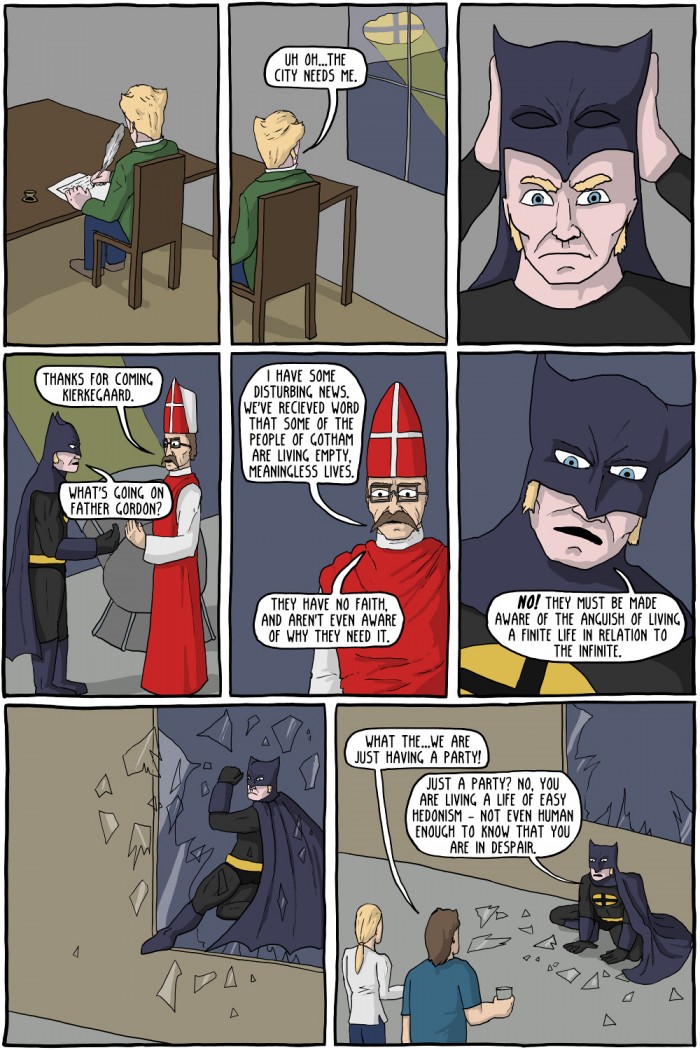
Father of Existentialism
Søren Kierkegaard was a 19th-century Danish philosopher who is considered by many to be the “father of existentialism.” He emphasized the centrality of the individual’s subjective experience to any conception of truth and famously said, “Anxiety is the dizziness of freedom.” He was referring, as the comic suggests, to the anxiety of living a finite life in relation to an infinite universe or God.
Basically, Kierkegaard thought we were all in the same existential predicament and needed to recognize our own freedom in order to embark on a path toward becoming a true self. Kierkegaard was himself a poet and had a soft spot for aesthetes, whom he characterized as escapists more or less drifting in their own imagination, finding delight and beauty in the quotidian world by means of poetic will.
Kierkegaard felt, however, that the individual must rise above the mere aesthetic to claim an ethical and ultimately religious existence. He argued that a “leap of faith” in the form of religious belief (he was a Christian) was ultimately the only path to becoming a true self. On Existential Comics, Corey almost always includes a “Didn’t get the joke?” box which elaborates on a particular comic and sometimes suggests further study. For this comic, he wrote:
“This comic is a bit of a mash up of a lot of Kierkegaard’s thought. You can read more about Kierkegaard on despair and anxiety (which he called the dizziness of freedom). Briefly, he thought people who tried to ignore or distract themselves from the human condition of having a finite life and being forced to make free choices were on the lowest stage of despair (but the worst to be in, for Kierkegaard). They had to become more aware of this, and develop themselves by making real choices in the world. This would cause more anxiety and despair, but eventually, he thought, the only solution would be to make the “leap of faith” into Christianity.
The “teleological suspension of the ethical” is from Fear and Trembling, which is Kierkegaard’s analysis of the story of Abraham being tested by God to sacrifice his son. Kierkegaard says that killing his son is unethical, since Abraham can’t be sure that it is really God giving him the command, but he must suspend the ethical due to his faith.”
Ultimately, I don’t personally agree with Kierkegaard’s assertion that Christian faith is the only means of arriving at a true self, but I appreciate his thought and have gleaned a number of useful and fascinating insights from studying his work.
For one, I’ve come to feel that his assertion that “subjectivity is truth” is correct, at least in the sense that our own personal truths and narratives about life are, in the final analysis, the only ones that make any difference for us. We create our own world through our thoughts, dreams, actions, and relationships, and I think that it is in this individual creation—rather than in a set of supposedly objective “facts”—that each of us must find whatever meaning life has to offer. I think Terence McKenna was channeling this idea when he said:
“You have to take seriously the notion that understanding the universe is your responsibility, because the only understanding of the universe that will be useful to you is your own understanding.
― Terence McKenna
For more on Kierkegaard, I recommend the article about him in the Stanford Encyclopedia of Philosophy, a perennially groovy resource. And, once again, be sure to check out more of Corey’s stelliferous philosophy comics over at Existential Comics.
If this was cool, read the mission and follow us on Twitter.
About Jordan Bates
Jordan Bates is a Lover of God, healer, mentor of leaders, writer, and music maker. The best way to keep up with his work is to join nearly 7,000 people who read his Substack newsletter.

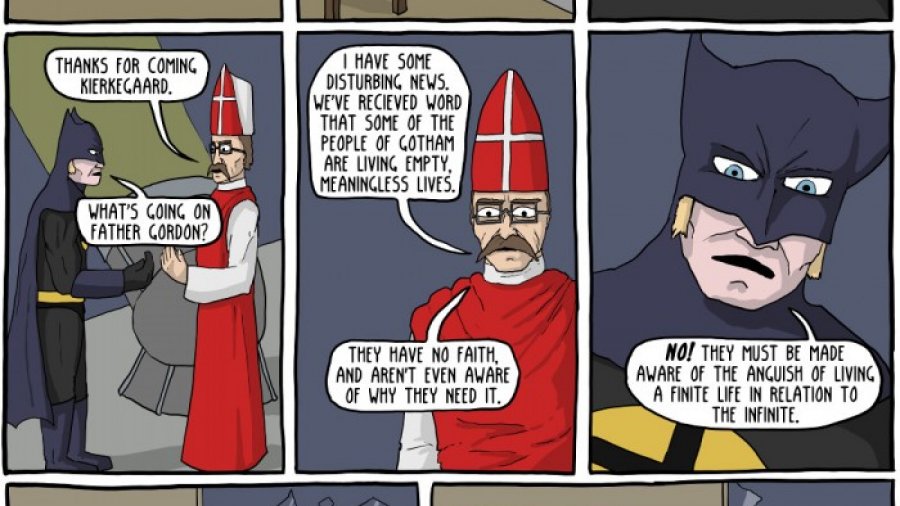
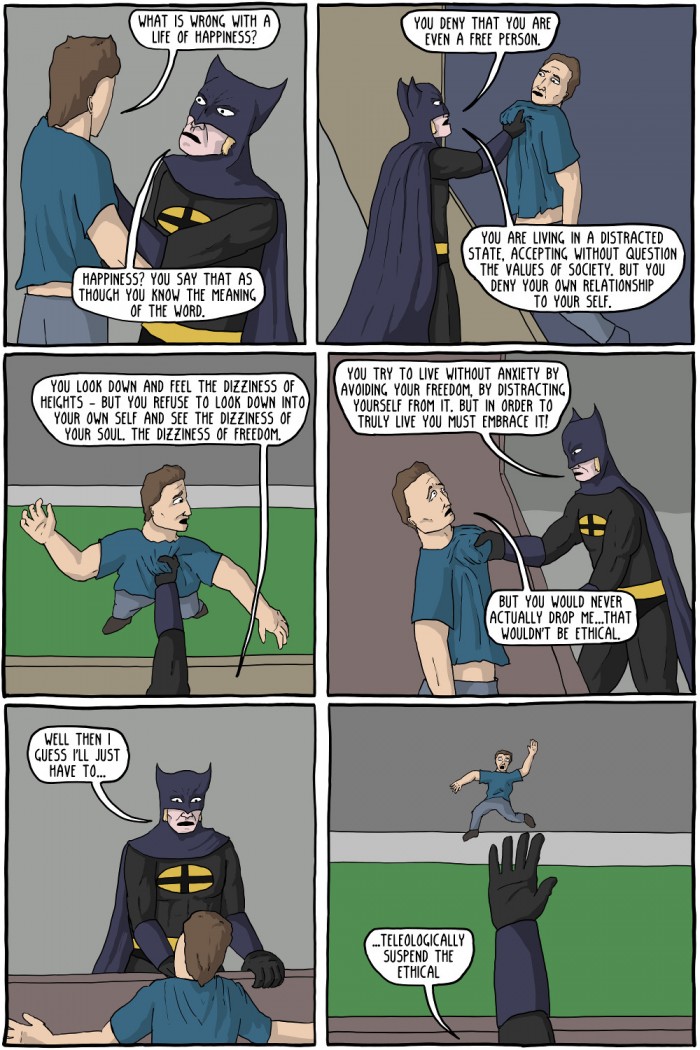
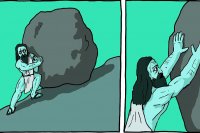
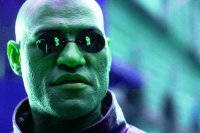

I tend to view the “Christian faith” argument (also made by Paul Tillich) as a kind of expedient means, or technique of self-projection and reception (ie one has the idea that faith is required or at least useful, thus, allowing the potential for the experiential confirmation or elucidation of new perspectives, ultimately religious perspectives). This is Hegel’s idea re: The Essence of Christianity. “God” in this sense would refer to a religious (social) technology – the Christian God meme- distinguished from the transpersonal, existential universality characteristic of “religious” “spiritual” or metaphysical thinking generally (considered categorically as types of thought dealing… Read more »
nick, that’s a super interesting idea: religions as ideological technology designed to push subjects toward religious contemplation, if nothing else. i don’t know enough about kierkegaard to know much about his christianity, but i know he was really critical of a lot of other christian thought during his time. there was a good essay someone sent me a while ago that i still haven’t read about how the author felt nietzsche would have approved of kierkegaard. pretty interesting considering their difference in religious belief. i’ll have to go back and find that and read it and maybe pass it on… Read more »